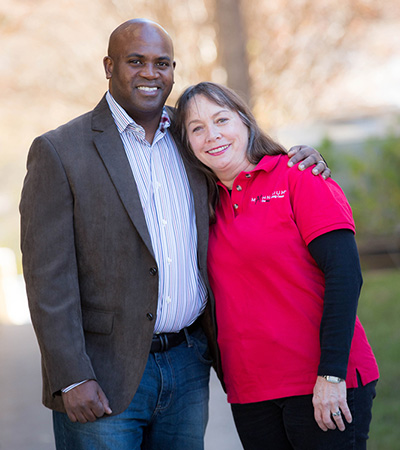Cancer survivor credits recovery to research study

By Sally Crocker
When Tomi Huff was diagnosed with ovarian cancer at 54, she feared she was going to die. No matter what the doctors said, she felt like her life was already over.
Fast forward six years and three rounds of chemotherapy later, and Tomi is cancer free with a renewed focus on keeping healthy.
She’s feeling stronger every day, and is able to “be there” for her four grown children and, hopefully, for future grandchildren.
Tomi credits an important part of her recovery to a UNT Health Science Center research study she joined six months ago when she was approached by Dr. Raheem Paxton, Assistant Professor in the School of Public Health’s Department of Behavioral and Community Health.
Dr. Paxton is working with cancer patients across the country to improve their survival rates through diet, exercise and healthy behaviors.
“Research has shown that cancer survivors can achieve longer-term, more positive outcomes and improved quality of life through diet and exercise,” Dr. Paxton said. “Regular physical activity can also help with pain management, anxiety, emotional well being, stamina and energy.”
With funding from the National Cancer Institute, Dr. Paxton began in 2014 the ALIVE Lifestyle Intervention research study for African American breast cancer survivors in North Texas. Working with other universities, health care organizations and cancer support groups across the U.S., Canada and Australia, he and colleagues have since expanded the project to provide healthy lifestyle support to cancer patients of any diagnosis, race, gender or ethnicity.
This fall, the program linked with the Dr. Susan Love Research Foundation’s Army of Women, a cancer survivors’ network supported in part by the Avon Foundation. Nearly 300 participants nationwide are now enrolled in the study.
The program is Internet-based and starts with a simple online questionnaire, where patients select goals to create their personal healthy living plan. From there, they gain support through email or text, online resources, phone calls or printed materials, according to their preferences. For Tomi, the goals were to get stronger and eat better.
“After my diagnosis, I had retired from teaching and found myself alone with a lot of time on my hands,” she said. “Three of my kids lived out of state. I was divorced and had recently broken up with my boyfriend. So I found myself sitting on my couch – becoming a part of the couch, actually – playing games on my laptop and watching movies. I wasn’t living healthy.”
Just about the time she received an email invitation from Dr. Paxton, Huff thought back to her own mother and grandmother, who had been diagnosed with cancer at later ages. Her grandmother survived uterine cancer in her 60s and lived to be 89. Her mother survived breast cancer for 12 years even with a late diagnosis and unhealthy habits like smoking.
“That got me to thinking. I have a lot of life left, and I want to be around for my children,” she said. “I realized I needed to be proactive with my health or I would die.”
Since joining the study, Huff has lost 17 pounds, eats more fruits and vegetables, feels better, attends exercise classes and is about to join yoga. She’s gone back to work as a part-time math tutor and has seen improvement in her bone-density measurements.
Most significantly, she now feels that she has a “support network of people who care.”
“When you get older, have aches and pains and are fighting a disease like cancer, you feel like you’re falling apart,” she said. “It’s hard to get motivated. It’s nice to know you’re not alone, that you have help. There is a lot more ahead of me. Who knows, maybe the love of my life is still out there waiting for me!”



![Uyen Sa Nguyen Scaled[58]](https://www.unthsc.edu/newsroom/wp-content/uploads/sites/16/Uyen-Sa-Nguyen-scaled58-145x175.jpg)

Social media